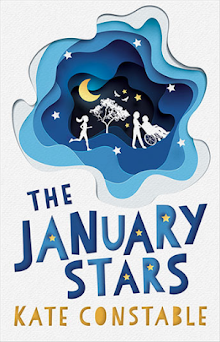Yes, Antonia Forest AGAIN! I bought this modern reissue, from the excellent Girls Gone By, at considerable expense, as a Christmas present for myself. The Players and the Rebels is actually part two of a pair of books about one of the Marlow family's Elizabethan ancestors, Nick Marlow, who after a series of misadventures, ends up in London working in the theatre as Will Shakespeare's apprentice. I know my school had these books in the library, and I certainly read them, but at the time I preferred the modern family stories and I have only a hazy memory of the plot, so I came to this book almost completely fresh.
As it's part two of two, it took me the first few chapters to reacquaint myself with the cast and adjust to the setting. Antonia Forest researched these books meticulously, but I gather Elizabethan and Shakespearean scholarship has moved on since the 1970s, so some of the details may not be quite accurate, but she brings the world of the theatre, Elizabethan London, and the tangled political situation vividly to life. In this book, Nick and his best friend Humfrey, a page to the Earl of Southampton, get mixed up in a failed rebellion -- a coup that doesn't come off -- and the muddle of the treachery is brilliantly told. But as always in Forest, it's not really the plot that counts, but the network of friendship, hero worship and obligation between the various characters: the debt of patronage between Southampton and Will; the deepening friendship between Will and Nick; the rivalries and jesting, and the bond between the various players; and the subtle shifts in Nicolas's loyalties as he matures and finds himself torn between conflicting duties of love and honour.
The Players and the Rebels is excellent historical fiction, subtle, intelligent and satisfying. I think I got more out of it as an adult, even though it was written for children.
Now I really need to get hold of The Player's Boy and fill myself in with what happened first!
25.6.15
17.6.15
Ash Road
I bought Ash Road on the Kindle, too! I thought it would be pretty easy to pick up second-hand, but it never seemed to be on the shelf in any of the stores I checked, and even Brotherhood Books only had a hardback fancy copy for $35. So Kindle it was…
Our topic for the Convent book group this month is Fire, and Ivan Southall's classic Ash Road is partly based on his own experience of living through the horrendous bushfires in the Dandenongs in 1962. My childhood home is in the foothills of the Dandenongs, and the threat of bushfire hung over us almost every summer, which made this novel particularly resonant. I had recurrent dreams about fleeing from fire, what to grab and what to leave, which haunt me to this day.
Southall's (mostly) young protagonists respond to the emergency and their unexpected isolation in different ways, with varying degrees of terror, resourcefulness, ignorance and courage; but in contrast to Hill's End, another Southall classic which I very much enjoyed, they don't really get the opportunity to work as a group, or to defeat the threat which overwhelms them. I guess this is because the catastrophe is just too big -- the only realistic response available is to hide or to run. This does rob his characters of some agency, and makes a less satisfying tale than Hill's End, where the kids rise to the challenges of the flood and to some extent overcome them, working together.
I found the scene where Grandpa Tanner lowers the two small children he is caring for into the well for safety, and stoically prepares to meet his own inevitable death, almost unbearably moving. He tells Julie to call out when people come -- Here I am, safe and sound, down the well! -- and reassures her, They'll find Grandpa, then they'll find you. Of course he means, the searchers will find his body first...
Southall's evocation of the fire, its immense power and force, is masterly and terrifying. I remember when I was a kid, I avoided Ivan Southall's books because they were just too frightening, too confronting for me. And I still don't know if I could bear to read Ash Road if I had ever been closer to a real bushfire.
Our topic for the Convent book group this month is Fire, and Ivan Southall's classic Ash Road is partly based on his own experience of living through the horrendous bushfires in the Dandenongs in 1962. My childhood home is in the foothills of the Dandenongs, and the threat of bushfire hung over us almost every summer, which made this novel particularly resonant. I had recurrent dreams about fleeing from fire, what to grab and what to leave, which haunt me to this day.
Southall's (mostly) young protagonists respond to the emergency and their unexpected isolation in different ways, with varying degrees of terror, resourcefulness, ignorance and courage; but in contrast to Hill's End, another Southall classic which I very much enjoyed, they don't really get the opportunity to work as a group, or to defeat the threat which overwhelms them. I guess this is because the catastrophe is just too big -- the only realistic response available is to hide or to run. This does rob his characters of some agency, and makes a less satisfying tale than Hill's End, where the kids rise to the challenges of the flood and to some extent overcome them, working together.
I found the scene where Grandpa Tanner lowers the two small children he is caring for into the well for safety, and stoically prepares to meet his own inevitable death, almost unbearably moving. He tells Julie to call out when people come -- Here I am, safe and sound, down the well! -- and reassures her, They'll find Grandpa, then they'll find you. Of course he means, the searchers will find his body first...
Southall's evocation of the fire, its immense power and force, is masterly and terrifying. I remember when I was a kid, I avoided Ivan Southall's books because they were just too frightening, too confronting for me. And I still don't know if I could bear to read Ash Road if I had ever been closer to a real bushfire.
12.6.15
The Paying Guests
Sarah Waters' latest novel, set in 1922, has been sitting on the pile beside the bed since Christmas -- I've been saving it up as a nice fat treat for myself. And it did not disappoint. What I most enjoy in Waters' books is the thick, immersive quality of her writing, the heft of domestic historical detail, so that I really feel as if I'm living alongside her protagonists -- I know exactly what they wear, what they eat, the objects in their houses, the way their kitchens smell. This vivid, painstaking detail might seem slow to some readers, but I find it deeply nourishing. And the social detail is equally vividly drawn -- in this case, the awkward relationship between the genteel poor Frances Wray and her widowed mother, and their 'brash' new lodgers, a married couple 'of the clerk class.' The polite clashes and awkward moments as the quartet adjust to their new circumstances are exquisite. And then awkwardness mutates into something more loaded, and the fun really begins.
I thoroughly enjoyed The Paying Guests, blurbed as 'a love story which is also a crime story.' Though it was fairly easy to predict the events of the plot, living them out through Frances' eyes, moment by moment, was a completely satisfying experience. I'm looking forward to whatever Sarah Waters does next.
I thoroughly enjoyed The Paying Guests, blurbed as 'a love story which is also a crime story.' Though it was fairly easy to predict the events of the plot, living them out through Frances' eyes, moment by moment, was a completely satisfying experience. I'm looking forward to whatever Sarah Waters does next.
10.6.15
Every Move
Please don't think that the fact that it's taken me a few days to write a book response to Ellie Marney's final volume in the Every series, Every Move, means that I didn't like it: reader, I loved it. (I've just had a busy few days.)
Writing the final book of a trilogy is hard. You have to wrap up the loose ends, and the eager reader knows that you're going to wrap up the loose ends. Your two protagonists have been building their relationship all this time -- they've earned each other, and your reader knows it. But you can't tie them up together too soon, because that's boring. You need to introduce a bit of tension -- enough to make it interesting for them to overcome, not so much that you frustrate your loyal reader who is longing for the fulfilment of their love almost as much as your characters are…
Ellie Marney handles this dilemma superbly. When Every Move opens, Rachel is suffering PTSD after the traumatic events of the last volume (this is all too plausible). Then Mycroft shoots off overseas and is absent for the first portion of the book, leaving a space open for a new character, Harris, to steal onto the scene. And it's all too clear to us (though not to Rachel) what Harris's feelings are. Meanwhile, their arch-enemy from the previous volume is closing in, and everyone is heading for a showdown, this time back in Rachel's home turf, the country home she left at the start of the series.
I just couldn't wait to get my hands on this. The minute I finished this blog post about Every Word, I picked up the Kindle and zap! There it was, waiting for me, instant gratification. If only I hadn't had to finish a book group title first, I would have devoured it on the spot. Ellie Marney mentions in the acknowledgements that she found this book hard to write, because she didn't want to say goodbye to her characters. And why would you? They're smart, great company, complicated, sexy. If they were mine, I wouldn't want to let them go either.
Writing the final book of a trilogy is hard. You have to wrap up the loose ends, and the eager reader knows that you're going to wrap up the loose ends. Your two protagonists have been building their relationship all this time -- they've earned each other, and your reader knows it. But you can't tie them up together too soon, because that's boring. You need to introduce a bit of tension -- enough to make it interesting for them to overcome, not so much that you frustrate your loyal reader who is longing for the fulfilment of their love almost as much as your characters are…
Ellie Marney handles this dilemma superbly. When Every Move opens, Rachel is suffering PTSD after the traumatic events of the last volume (this is all too plausible). Then Mycroft shoots off overseas and is absent for the first portion of the book, leaving a space open for a new character, Harris, to steal onto the scene. And it's all too clear to us (though not to Rachel) what Harris's feelings are. Meanwhile, their arch-enemy from the previous volume is closing in, and everyone is heading for a showdown, this time back in Rachel's home turf, the country home she left at the start of the series.
I just couldn't wait to get my hands on this. The minute I finished this blog post about Every Word, I picked up the Kindle and zap! There it was, waiting for me, instant gratification. If only I hadn't had to finish a book group title first, I would have devoured it on the spot. Ellie Marney mentions in the acknowledgements that she found this book hard to write, because she didn't want to say goodbye to her characters. And why would you? They're smart, great company, complicated, sexy. If they were mine, I wouldn't want to let them go either.
3.6.15
Boy Overboard
This was my second reading of Morris Gleitzman's Boy Overboard, and I must admit, I probably wouldn't have gone back to it if we hadn't been reading it for my book group. The story is told through the eyes of Jamal, who comes across as an average, very naive, soccer-mad Aussie boy, except that he's living in Afghanistan. Jamal's parents are in trouble with the government, and soon the family are on the run, at the mercy of people smugglers, pirates and the goodwill of the Australian government, seeking asylum in Australia.
Morris Gleitzman deserves nothing but praise for his willingness to tackle controversial issues (this book was published in 2002, when the refugee problem was just beginning to raise its head in this country) and to present them in ways that are very accessible for his target audience. I think this book would work extremely well as a read-aloud to a classroom of middle or upper primary kids, who would probably relate to Jamal as an ordinary kid no different from themselves (if slightly dumber). The story certainly encourages a compassionate view of asylum seekers, which is something we need more of at the moment.
But… for an adult, it's a frustrating read. Jamal's ignorance, and the antics of his little sister Bibi, who seems determined to get herself shot by picking inappropriate fights with authority at any given moment, become grating pretty quickly. And Gleitzman's choppy style -- short, punchy sentences, misunderstandings on every page -- also became a bit wearing. But this book is not intended for me, and it seems to have been a hit with its target audience. Gleitzman definitely knows how to write for primary kids, and he writes about subjects that they need to know about. So there is room on my bookshelf for Boy Overboard.
Morris Gleitzman deserves nothing but praise for his willingness to tackle controversial issues (this book was published in 2002, when the refugee problem was just beginning to raise its head in this country) and to present them in ways that are very accessible for his target audience. I think this book would work extremely well as a read-aloud to a classroom of middle or upper primary kids, who would probably relate to Jamal as an ordinary kid no different from themselves (if slightly dumber). The story certainly encourages a compassionate view of asylum seekers, which is something we need more of at the moment.
But… for an adult, it's a frustrating read. Jamal's ignorance, and the antics of his little sister Bibi, who seems determined to get herself shot by picking inappropriate fights with authority at any given moment, become grating pretty quickly. And Gleitzman's choppy style -- short, punchy sentences, misunderstandings on every page -- also became a bit wearing. But this book is not intended for me, and it seems to have been a hit with its target audience. Gleitzman definitely knows how to write for primary kids, and he writes about subjects that they need to know about. So there is room on my bookshelf for Boy Overboard.
1.6.15
Speechless: My Recovery From Stroke
I stumbled on Jennifer Gordon's memoir Speechless: My Recovery From Stroke while I was browsing on Brotherhood Books. It's a slim volume but hugely informative, and though it was written in 1990, I found it incredibly useful and insightful about the effects of stroke.
It's almost exactly two months since my father had a massive stroke which has robbed him of his speech, and movement on the right side of his body. Jennifer Gordon's stroke was much less severe physically than my dad's, but her loss of speech and concentration was profound (during the course of the book she achieves a good, though not complete, recovery). My mother and I have both read it, and found her descriptions of the lived experience of stroke really helpful in trying to understand what life is like for Dad now -- the intense fatigue, the loss of concentration, loss of meaning in concepts even when superficial understanding still exists ('months' no longer had meaning for her, and she couldn't string together her memories in a meaningful sequence), the emotional lability and easy tears.
Of course, every individual is different -- one thing that troubled Jennifer Gordon greatly was the loss of her sense of humour, something which Dad certainly hasn't suffered. He is easily moved to tears, but he is equally quick to roar with laughter. In a strange way, he is more emotionally accessible to us now than he was before the stroke. I wonder if on some level, being freed from all the daily responsibilities and petty worries of his previous life has freed him up to enjoy small pleasures (cake, company, completing a jigsaw) in an uncomplicated, wholehearted way -- it would be nice to think there is some silver lining to this dreadful transformation. But he is still making progress, and having read about Gordon's experience of 'brain clicks' where she would make a sudden leap of progress, many months after the stroke, has helped to bolster our optimism.
We are aiming to get Dad to come home for Christmas; and if Jennifer Gordon could travel to England alone six months after her stroke, why not??
It's almost exactly two months since my father had a massive stroke which has robbed him of his speech, and movement on the right side of his body. Jennifer Gordon's stroke was much less severe physically than my dad's, but her loss of speech and concentration was profound (during the course of the book she achieves a good, though not complete, recovery). My mother and I have both read it, and found her descriptions of the lived experience of stroke really helpful in trying to understand what life is like for Dad now -- the intense fatigue, the loss of concentration, loss of meaning in concepts even when superficial understanding still exists ('months' no longer had meaning for her, and she couldn't string together her memories in a meaningful sequence), the emotional lability and easy tears.
Of course, every individual is different -- one thing that troubled Jennifer Gordon greatly was the loss of her sense of humour, something which Dad certainly hasn't suffered. He is easily moved to tears, but he is equally quick to roar with laughter. In a strange way, he is more emotionally accessible to us now than he was before the stroke. I wonder if on some level, being freed from all the daily responsibilities and petty worries of his previous life has freed him up to enjoy small pleasures (cake, company, completing a jigsaw) in an uncomplicated, wholehearted way -- it would be nice to think there is some silver lining to this dreadful transformation. But he is still making progress, and having read about Gordon's experience of 'brain clicks' where she would make a sudden leap of progress, many months after the stroke, has helped to bolster our optimism.
We are aiming to get Dad to come home for Christmas; and if Jennifer Gordon could travel to England alone six months after her stroke, why not??
Subscribe to:
Posts (Atom)



















